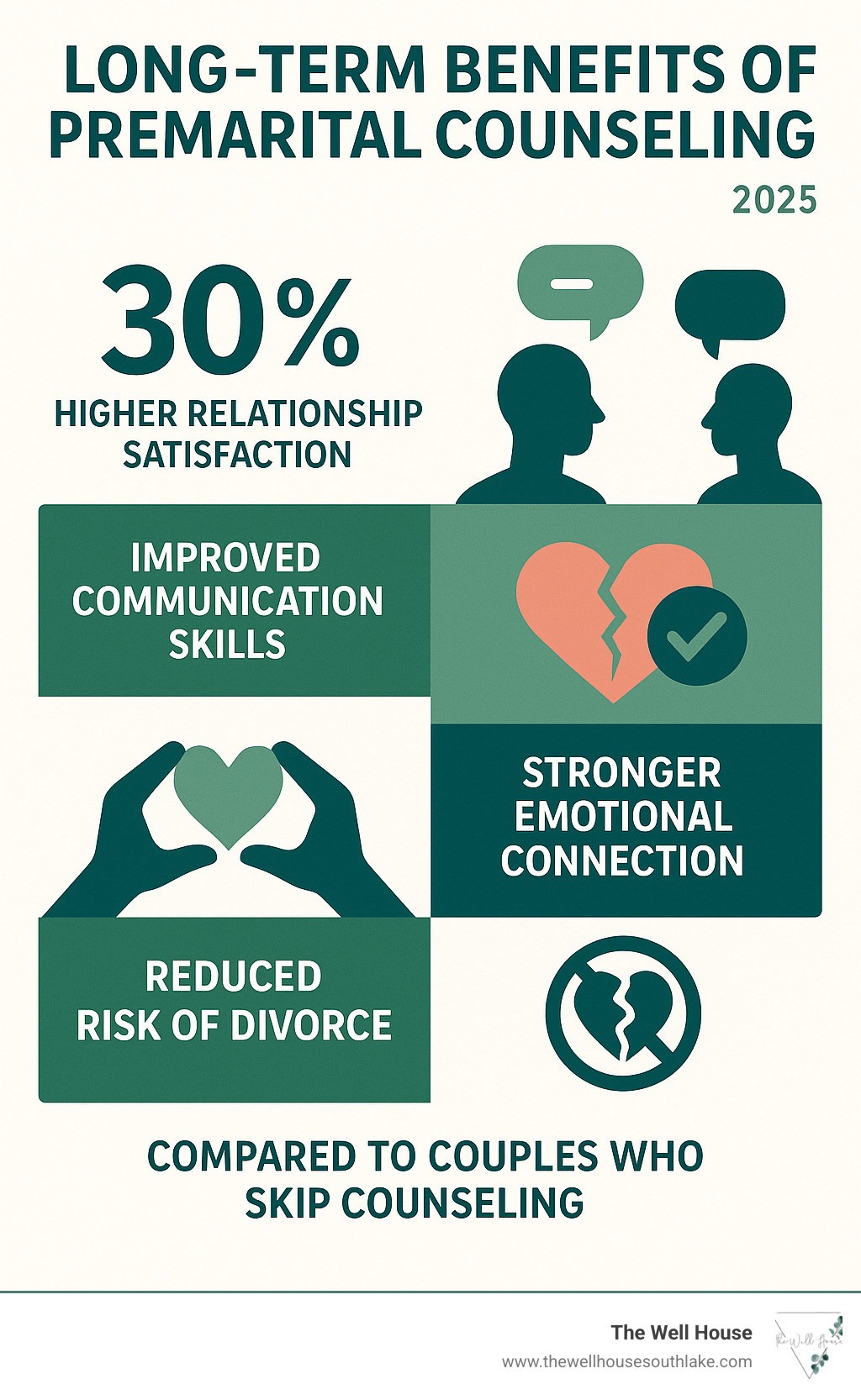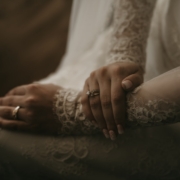Before “I Do”: A Guide to Couples Counseling for a Stronger Marriage
Why Investing in Your Relationship Before “I Do” Matters
Counseling for engaged couples is one of the smartest investments you can make in your future. Research shows that couples who participate in premarital counseling have higher relationship satisfaction and greater resilience when facing life’s challenges.
What counseling for engaged couples offers:
- Proactive relationship strengthening before problems arise
- Essential communication skills for handling conflict
- Tools for discussing finances, family, and future goals
- Professional guidance in building a strong foundation
- Higher success rates for long-term marital satisfaction
Many couples spend months planning their wedding day but little time preparing for their marriage. While wedding details fade, the skills learned in counseling create lasting benefits that strengthen your bond for decades.
Think of it as preventative healthcare for your relationship. Investing in your relationship’s health before marriage sets you up for success. Studies indicate that couples who take this proactive approach are better equipped to weather hardships and maintain deeper emotional connections.
Starting this work before engagement allows for complete honesty. Once you’re engaged, social pressures can make it harder to address potential issues openly.
I’m Jennifer Kruse, a Licensed Professional Counselor Supervisor who takes a holistic soul-mind-body approach to helping couples build strong foundations. I’ve seen how this proactive investment transforms relationships and sets couples up for lasting happiness.

Basic counseling for engaged couples glossary:
Why Counseling for Engaged Couples is a Game-Changer for Your Marriage
Think of counseling for engaged couples as a proactive approach to your marriage. Instead of waiting for problems to arise, you’re building the skills to prevent issues from becoming major roadblocks. It’s about creating resilience before you need it.
When couples invest in this preparation, they develop a deeper understanding of each other’s needs and communication styles. They learn how to steer disagreements without damaging their connection. Most importantly, they build a toolkit they’ll use for decades.
The statistics speak for themselves—couples who go through this process report higher relationship satisfaction and are better equipped to handle life’s curveballs. Whether it’s job stress or financial challenges, they weather these storms as a team.
This approach is powerful because you’re not just learning about marriage in theory. You’re practicing real skills in a safe space with professional guidance, building confidence and healthy patterns from day one.
To understand more about how professional support benefits all couples, check out Why Marriage Counseling Couples Therapy Is For Everyone.
The Proactive Power: Pre-Engagement vs. Pre-Marital Counseling
The timing of your counseling matters. There’s a key difference between pre-engagement counseling and pre-marital counseling.
Pre-engagement counseling happens before the ring and public announcements. This timing creates a unique opportunity for objectivity. You can explore the big questions without the pressure of public commitments.
Once you’re engaged, excitement, family expectations, and a reluctance to rock the boat can make it harder to have tough conversations about long-term compatibility.
Pre-engagement counseling removes those social pressures. You can address potential deal-breakers honestly, explore whether your life goals align, and make an informed decision about moving forward with engagement.
| Aspect | Pre-Engagement Counseling | Pre-Marital Counseling |
|---|---|---|
| Timing | Before the proposal/engagement | After engagement, before wedding |
| Goals | Assess readiness and compatibility | Build skills for married life |
| Couple’s Mindset | Open to all possibilities | Committed to marrying |
| Focus | Exploring fundamental questions | Preparing for marriage success |
Both approaches are valuable, but pre-engagement counseling offers the freedom to explore without commitment pressure.
Long-Term Benefits: Investing in a Lifetime of Happiness
The real magic of counseling for engaged couples appears years later. The skills you learn become the foundation of your entire marriage.
Building resilience for future challenges is a huge payoff. Life will test your relationship with job changes, health scares, and family conflicts. Couples who’ve done this work know how to support each other through tough times instead of letting stress drive them apart.
You’ll also develop an improved emotional connection that deepens over time. Learning to truly hear each other and express needs clearly are skills that compound over the years, turning better communication into stronger intimacy.
Perhaps most importantly, you’ll create a shared vision for your future. This goes beyond agreeing on kids or where to live; it’s about understanding each other’s dreams and values. When you’re aligned on these deeper levels, you move through life as true partners.
For more insights on building this kind of connection, explore Communicating With Your Partner For Better Connection.
The Core Conversations: What to Discuss in Counseling Sessions
Counseling for engaged couples provides a safe, neutral space to have the important conversations you might be avoiding. Think of us as your relationship GPS, helping you steer these discussions with skill and care. Our sessions allow both of you to speak honestly without fear of judgment or spiraling conflict.
The magic happens when couples find they can talk about anything—even the tough stuff—and come out stronger. We help you uncover blind spots and learn to handle differences in ways that bring you closer.
Essential Topics for Engaged Couples
Every couple is unique, but certain topics are game-changers for building a strong marriage. Here are the big ones we make sure to cover.
- Finances and budgeting: Money is a common source of conflict. We’ll help you discuss spending habits, debt, and financial goals, including sensitive topics like joint vs. separate accounts.
- Family of origin and in-laws: Your childhood experiences shape your marital expectations. We also tackle in-law relationships and help you set healthy boundaries.
- Communication styles and conflict resolution skills: We help you understand each other’s patterns during disagreements and develop tools for productive conversations, even when emotions are high.
- Roles and responsibilities: Who handles what? How do you make decisions together? We’ll help you create a framework for your partnership.
- Intimacy and affection: This includes physical intimacy, emotional connection, and how you each prefer to give and receive love. Many couples assume they’re on the same page without ever checking.
- Life goals and dreams: Where do you see yourselves in ten years? We help you explore how to support each other’s ambitions while building a life together.
- Parenting styles: Even if kids aren’t in your immediate future, discussing your thoughts on parenting helps prevent major surprises later.
- Spiritual beliefs: We create space to explore how your individual spiritual journeys fit together and what role faith might play in your marriage.
The Role of Assessments: Tools Used at The Well House
Professional counseling for engaged couples often uses scientifically-backed assessments to provide objective data about your relationship—think of them as a relationship health check-up.
These tools help identify your unique strengths and highlight growth areas where focused attention can make a huge difference. One of our go-to assessments is the PREPARE/ENRICH inventory, which has helped over 3 million couples prepare for marriage. It explores everything from communication patterns to financial management.
Assessments spark conversations you might never have had otherwise. They help us understand personality differences and how to work together harmoniously. The results become our roadmap, allowing us to tailor your counseling experience to your specific needs. We have certified Prepare/Enrich Counselors Near Me who can guide you through this powerful process.
Finding Your Guide: How to Choose the Right Counselor
Finding the right therapist for counseling for engaged couples is crucial. This person will guide you through intimate conversations, so the fit must feel right for both of you.
The right counselor will create a space where both partners feel heard, respected, and comfortable being vulnerable. You’re looking for someone with solid professional qualifications, a therapeutic approach that resonates with you, and, most importantly, someone you both trust.
Think of it this way: you wouldn’t choose a wedding photographer without meeting them first. The same principle applies here. Trust your gut feeling during this process.
Steps to Finding a Qualified Therapist
- Research your options. Explore specialized platforms like Psychology Today’s therapist directory or the Gottman Referral Network. These resources let you filter by location and specialties like “premarital counseling.”
- Check credentials. In Texas, look for Licensed Marriage and Family Therapists (LMFTs) or Licensed Professional Counselors (LPCs) who specialize in couples work. Ask about their experience with engaged couples.
- Schedule consultations. Most therapists offer brief introductory calls. Use this time to discuss their process, ask about their approach, and see if their style matches your needs.
- Discuss with your partner. After your consultations, talk honestly about your impressions. A therapist who is perfect for one of you but makes the other uncomfortable won’t serve your relationship well.
At The Well House, we offer a collaborative, holistic approach that addresses your mind, body, and spirit. Our diverse team tailors our methods to your unique needs, with in-person sessions in Southlake, Westlake, Grapevine, Roanoke, and Trophy Club, or through our Online Couples Counseling Near Me services across Texas.
Preparing for Your First Counseling for Engaged Couples Session
Walking into your first counseling for engaged couples session can feel like a mix of excitement and nervousness. Proper preparation helps you maximize this investment.
- Set goals together. Before your first appointment, discuss what you both hope to gain. Shared objectives help your counselor tailor the sessions to your needs.
- Be open and honest. This is your judgment-free zone. Come prepared to share your authentic thoughts and feelings, even when it feels uncomfortable.
- Manage your expectations. Counseling is a process that requires effort and patience from both partners. Discomfort is often a sign of growth.
- Discuss any concerns beforehand. Acknowledge any nervousness openly with each other. Naming these feelings can reduce their power.
- Be ready to listen and learn. Come with an open mind and genuine curiosity about your partner’s perspective, especially when it differs from your own.
For a comprehensive look at what to expect, check out our guide: Love On The Couch: Your Guide to Couples Therapy.
Common Pitfalls and How to Avoid Them
Think of counseling for engaged couples like planning a dream vacation—you wouldn’t book flights the night before. Yet many couples make similar mistakes when preparing for marriage. Understanding these common pitfalls can help you maximize your investment and set your marriage up for success.
This work is designed to be proactive. We’re not trying to fix problems—we’re helping you build the skills and understanding you’ll need for a lifetime of happiness together.
Mistake #1: Waiting Too Long
One of the biggest mistakes couples make is starting counseling for engaged couples too close to the wedding. When you’re overwhelmed with planning stress, there isn’t enough mental or emotional bandwidth for the deep, meaningful conversations that make counseling effective.
Complex topics like finances, family dynamics, or future dreams can’t be explored in a few hurried sessions. It’s like trying to build a house foundation while the walls are already going up.
Our recommendation? Start your counseling journey at least 3 to 6 months before your wedding date. This gives you the breathing room to dig into important discussions, practice new skills, and address potential concerns without the pressure of a looming deadline.
Mistake #2: Avoiding the Tough Topics
Some couples worry that bringing up sensitive topics in counseling might create conflict, so they stick to safe, surface-level conversations. But the purpose of counseling is to highlight potential issues, not to create them. Those differences already exist; ignoring them now just means they’ll likely resurface later with more intensity.
Counseling for engaged couples creates a safe space for vulnerability where you can openly discuss everything from your deepest fears to your most important goals. These conversations might feel uncomfortable, but addressing red flags before they become major problems is what this work is designed to do. We help you turn potential challenges into opportunities for deeper understanding and connection.
A strong marriage isn’t built on avoiding conflict—it’s built on learning how to work through differences together.
Mistake #3: Choosing the Wrong Guide
Many couples assume meeting with their officiant covers all their pre-marital preparation. While spiritual leaders provide wonderful guidance, they often lack the specialized training of Licensed Marriage and Family Therapists (LMFTs) or Licensed Professional Counselors (LPCs). Professional therapists are trained to identify complex relationship patterns and teach evidence-based communication techniques.
The importance of finding an unbiased professional cannot be overstated. You need someone who isn’t personally invested in whether your wedding happens. This objectivity allows for complete honesty and helps ensure that both partners feel comfortable sharing their true thoughts.
Even if faith is important, you can have both spiritual guidance and professional expertise. Our Faith-Based Couples Counseling combines the best of both worlds—honoring your spiritual values while providing the clinical skills that make counseling effective.
Frequently Asked Questions about Counseling for Engaged Couples
We love when couples ask thoughtful questions about counseling for engaged couples. It shows they’re taking this important step seriously! Here are the most common questions and our honest answers.
How is pre-marital counseling different from regular couples therapy?
While both involve working with a therapist to strengthen your relationship, the timing and focus are different.
Counseling for engaged couples is about prevention and preparation. The focus is on building essential skills, establishing healthy communication patterns, and preparing you for marriage before you walk down the aisle. You’re establishing healthy patterns from the start and building a sturdy foundation for the future.
Regular couples therapy, on the other hand, is often about crisis intervention or repairing long-standing issues. It typically addresses problems that have already taken root, such as a breakdown in communication or a loss of trust.
The goal of pre-marital work is to give you the tools so you hopefully never need crisis intervention. It’s preparing for a future together rather than fixing what’s already broken.
How many sessions do we need?
The truth is, it varies by couple and depends on your goals. Most couples find that 6 to 12 sessions provide a solid foundation. If we’re using a structured program like PREPARE/ENRICH, we often see significant progress in 8 to 10 sessions.
Some couples feel confident after 6 sessions, while others prefer to explore topics more thoroughly over 12 or more. Some therapists offer structured programs, while others create a custom plan. At The Well House, we work with you to determine what feels right for your relationship.
Is pre-marital counseling covered by insurance?
Pre-marital counseling is often not covered by health insurance. Insurance companies typically cover services for diagnosed mental health conditions, and pre-marital counseling is considered preventative education rather than treatment.
We encourage couples to view this as an investment in your relationship’s future. You spend money on your wedding to create memories for one day. Counseling for engaged couples is an investment in every day that comes after.
The skills you learn and the understanding you gain will benefit you for decades. It’s far more cost-effective than divorce, both emotionally and financially. The peace of mind that comes from knowing you’ve prepared for a successful marriage is priceless.
Insurance & Payment Options at The Well House Southlake
At The Well House Southlake, we believe that quality mental health care should be both accessible and affordable. Whether you’re seeking therapy, couples counseling, or online sessions, our goal is to make it easy for you to access therapy that takes insurance and supports your unique needs.
We currently accept:
- Blue Cross Blue Shield (BCBS)
- Aetna
- United Health care (UHC)
- Self-Pay and Out-of-Network Options
If you’re exploring counseling that takes insurance or need help verifying your coverage, our team will guide you through each step — from confirming your benefits to booking your first session. We’re committed to making your experience simple and stress-free, so you can focus on what matters most: your well-being.
Conclusion
Imagine your marriage ten years from now. After weathering life’s storms, you’re still deeply connected and growing together. That’s the power of starting with a strong foundation built through counseling for engaged couples.
This process is like hiring the best architect for the most important project of your life—your marriage. While your wedding day creates beautiful memories, the skills you gain in counseling create the blueprint for decades of happiness.
Most couples spend months focused on details that will be forgotten within weeks. But the communication tools, deeper understanding, and conflict resolution strategies you learn are gifts that last a lifetime.
We’ve seen countless couples transform their relationships through this proactive work. They don’t just survive marriage—they thrive in it, facing challenges as teammates and building something beautiful and lasting together.
At The Well House, we believe every couple deserves this kind of partnership. Our holistic approach honors your mind, body, and spirit, recognizing that the strongest marriages flourish when all parts of you are nurtured. We are guides helping you find and use your unique strengths as a couple.
Your future self will thank you for taking this step. Don’t leave the most important relationship of your life to chance. Start building your foundation with couples therapy at one of our welcoming locations in Southlake, Westlake, Grapevine, Roanoke, or Trophy Club, TX.
Because when it comes to love, preparation isn’t just smart—it’s one of the most loving things you can do for each other.














